By Hamza Idris
Today, July 27, 2025, marks my 53rd birthday.
I received many text and WhatsApp messages from family, friends and acquaintances. I also saw wonderful felicitations on Facebook and other social media platforms. I appreciate all of you with all sense of responsibility.
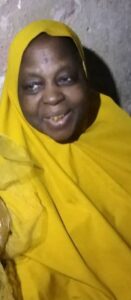
But unlike previous years when I would reflect on life’s milestones or share moments of joy with family and friends, this day comes wrapped in silence and sorrow. I mark this new age in a deeply sombre mood.
The reason is simple but heavy: I am still mourning the loss of our beloved mother, Hajiya Umma Sabiu, fondly called Hajiya Umma, who departed this world barely a month ago on June 23, 2025, at the age of 75.
Her passing has left a vacuum no celebration can fill.
So, instead of counting triumphs or shortcomings as people often do on their birthdays, I choose to honour her memory.
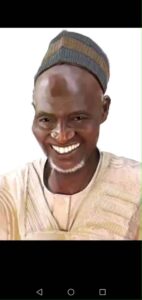
I also take a moment to remember our late father, Alaramma Idris Hamza, who passed on October 12, 2019, at the age of 78. In less than three months, it will be six years since we laid him to rest.
Our mother was a tower of strength and an embodiment of hope. She believed that with faith and determination, nothing was impossible. She wasn’t just a mother to me and my ten siblings born directly of her womb, she was also a mother to our father’s ten other children from his two other wives. All 21 of us were raised under the same roof, alongside many cousins, nieces and nephews from our extended family. She gave us love equally and selflessly.
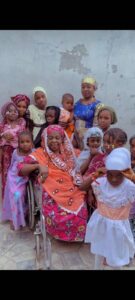
To many of my friends and the friends of my siblings, Umma was a second mother. In fact, some of them often joked that they had a greater claim to her than even we, her children, did. That was not far from the truth. She saw everyone as hers, and offered warmth, prayer, and guidance to all who came close.
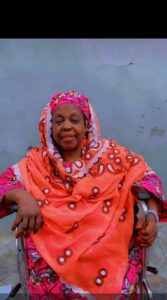
She devoted her life to keeping the family united, offering prayers in every conversation, no matter how brief. Her belief in the 99 names of Allah—Asma’ul Husna was a hallmark of her piety, and made her a revered figure among friends, family, and neighbours in Jos, where she lived for nearly 50 years before moving to Kano in 2020, following our father’s passing.
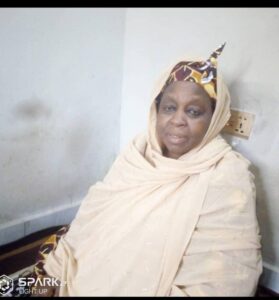 Sadly, like our father, who we took to Kano for treatment and never returned home, she also died in Kano. And by Allah’s will, they now rest side-by-side at the graveyard near the abattoir in Kano.
Sadly, like our father, who we took to Kano for treatment and never returned home, she also died in Kano. And by Allah’s will, they now rest side-by-side at the graveyard near the abattoir in Kano.
SHE WAS AN INDUSTRIOUS MOTHER
Even though Umma is no longer with us, but her legacy lives on in our hearts, in our memories, and in the stories of resilience and hard work that defined her remarkable life.
At her prime, before diabetes slowed her down, our mother was the very definition of industriousness. Though a full-time housewife, she was by no means idle or dependent. She engaged in various petty trades, juggling multiple vocations not just to support our father, but to ensure that we, her children, never lacked. Her hands were always busy, and her mind constantly sought honest means to support the family.
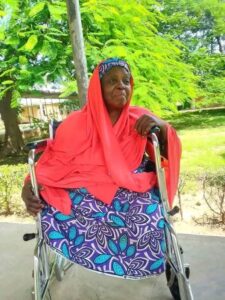
I remember vividly how in the early 1990s, she used to send me to Kanam and Mangu local government areas in Plateau State to buy groundnuts and maize. She would resell them in Jos and make profits, which she channeled entirely to the home front. It was a hustle I gladly juggled with my education, knowing the weight of her sacrifice.
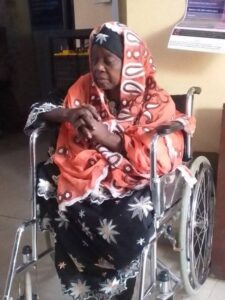
She was a tailor. She plaited women’s hair in the neighbourhood. She operated a grinding machine for the community and even mastered the art of knitting the beautifully crafted Zanna Bukar caps so popular in Northern Nigeria. There was hardly any legitimate skill she didn’t try her hands on, all in a bid to ensure that her children never returned home from school to an empty plate.
She lived a life of selflessness. Whatever little money she made, she spent it on our education, feeding, and general wellbeing. Yet, deep within her heart was a long-held desire — one she never truly verbalised with urgency, but which we all knew: to perform the holy pilgrimage to Makkah and visit the Prophet Muhammad (SAW). It was her life’s ambition. But, time and again, she put our collective needs ahead of that dream.
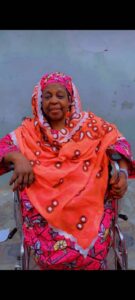
Knowing how much it meant to her, I made a vow: one day, by Allah’s grace, I would take her to Hajj.
In 2010, just a few years into my career, I quietly began saving towards that goal. I didn’t tell anyone at first. Though the money wasn’t complete, the Muslim Pilgrims Welfare Board directed that it was time to secure international passports for prospective pilgrims.
That was when the secret slipped out. She found out. So did our father. But beyond that, I was faced with a tough reality: our mother had become frail. She couldn’t walk long distances without support. The rigours of Hajj would overwhelm her unless she had a companion.
I sat with our father and told him of my fears that though I had nearly finished saving for her seat, she would struggle without someone by her side.
He looked at me calmly and, with unwavering faith, said, “By Allah’s Grace, you will travel for Hajj with your mother.”
I left for Damaturu, where I was working as a journalist, pondering his words. I was still short on funds. How could I possibly pay for my seat as well?
Then came the miracle. A few weeks later, our father called, his voice brimming with joy. One of his former students in Abuja had sent him money to pay for Hajj seat. I was overjoyed because this meant he could now accompany our mother.
But he wasn’t done. He said, again with conviction, “By Allah’s will, the three of us will perform Hajj together this year.”
I was stunned. I wanted to believe him but I had no idea how.
Then, just days before the closing of Hajj preparations, my boss, Malam Abdullahi Bego, who was then the Chief Press Secretary to Governor Ibrahim Gaidam of Yobe State, delivered yet another miracle: the governor had approved Hajj seats for selected journalists, and I was among them. Alongside me were Malam Mamman Mohammed (now Press Director to Governor Buni) and Dr. Ahmed Bedu (then NUJ chairman in Yobe, now of the University of Maiduguri).
Alhamdulillah. In 2010, I fulfilled my promise. I stood side by side with my mother and father in the Holy Land, performing the pilgrimage she had always dreamed of. The emotions, the prayers, the moments they are etched forever in my soul (full story on this would be told some other day).
A CHEERFUL MOTHER
Until her last breath, our mother remained a cheerful giver. Our married sisters and their children would often benefit from whatever we brought her. They knew her generosity well. Whenever we visited and she had some money, her home would be filled with love and laughter, with family members trooping in to get their share, not just of food or money, but of her warmth and kindness.
LIFE OF RESILIENCE
Our mother lived with diabetes for over 25 years. What would have broken many only made her stronger. Around 2011, a blister on her toe grew worse despite repeated dressings. By 2013, doctors advised amputation to prevent further complications. She accepted the decision with courage, undergoing surgery that saw her right leg amputated above the knee.
Five years later, she had to undergo another amputation—this time, her left leg. Still, she remained unshaken. Even without her limbs, her spirit soared. Unless told, visitors could not tell she had any physical disability. She carried herself with grace, rarely leaving home except for hospital visits. Though we got her artificial limbs, she was never enthusiastic about using them. True to her nature, she adjusted quickly and lived on without complaints.
Her strength was not just physical, it was spiritual. In the early days of her illness, she took insulin and multiple medications. But in her final years, doctors reduced the drugs, and even discontinued insulin. She ate what we ate, and rarely visited the hospital. Her resilience baffled even her doctors, who once joked that her diabetes had “reversed.”
Around 2023, the diabetes took a toll on her hearing ability, but we were undettered. We got a hearing aid for her following an excellent review by her doctors at the Aminu Kano Teaching Hospital (AKTH) and life continued as normal.
As Allah pleases, she lacked nothing while she lived. In fact, we rarely remembered that she was incapacitated. She was full of life all the time.
On the seventh day of her Fidda’u in Jos, after the third day prayers in Kano following her death, I cried silently on my journey back to Abuja together with my family.
A moment hit me with full force: the phone was silent. There was no call from Umma asking where I had reached, no prayer from the other end of the line. A ritual I had grown accustomed to for decades had ended. The silence was deafening.
Our mother was not just a homemaker. She was a pillar. She was our first teacher, our guide, our safe space. Her industriousness was not merely about money; it was about ensuring dignity, stability, and hope for her family.
Now that she is no longer with us, we find comfort in the fact that she left behind more than memories. She left a legacy of love, resilience, hard work, and sacrifice.
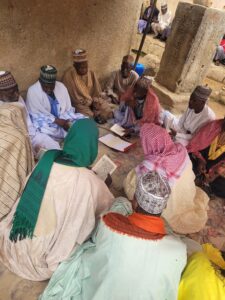
Both our parents were people of deep faith, of unyielding devotion to Allah and unwavering love for their children and community. Their legacy lives on in us, their children, grandchildren, and those they touched.
Finally, on this birthday, I reflect not on what I have gained or lost in worldly terms, but on what I have inherited in spiritual and moral compass from two exceptional people: Alaramma Idris Hamza and Hajiya Umma.
May Allah forgive their shortcomings and continue to bless all mothers and fathers who labour in silence for their families.
Ameen.
Inna Lillahi Wa Inna Ilaihi Raji’un.
Idris is the Editor-in-Chief of Daily Trust, and Vice President (North) of the Nigerian Guild of Editors























